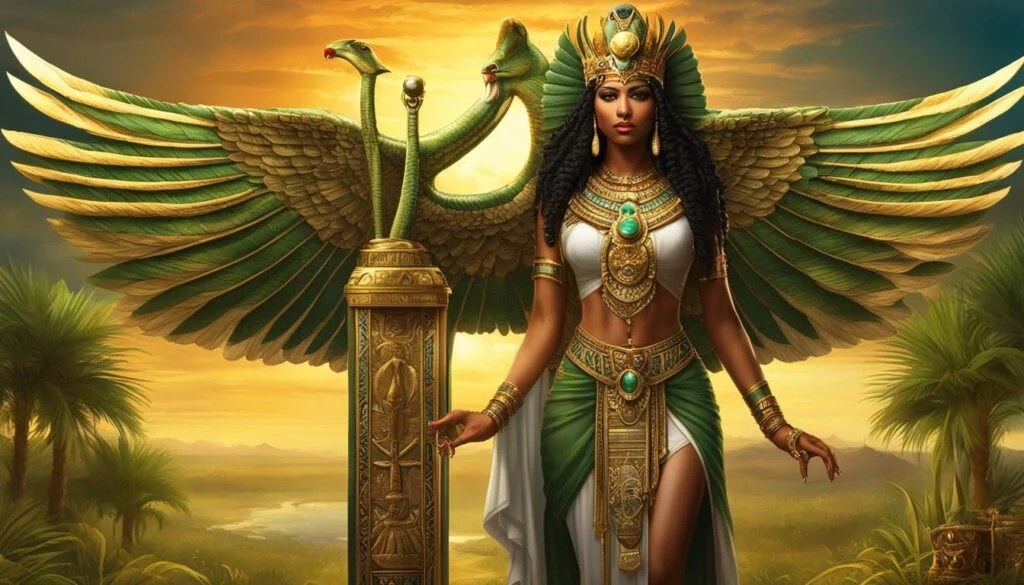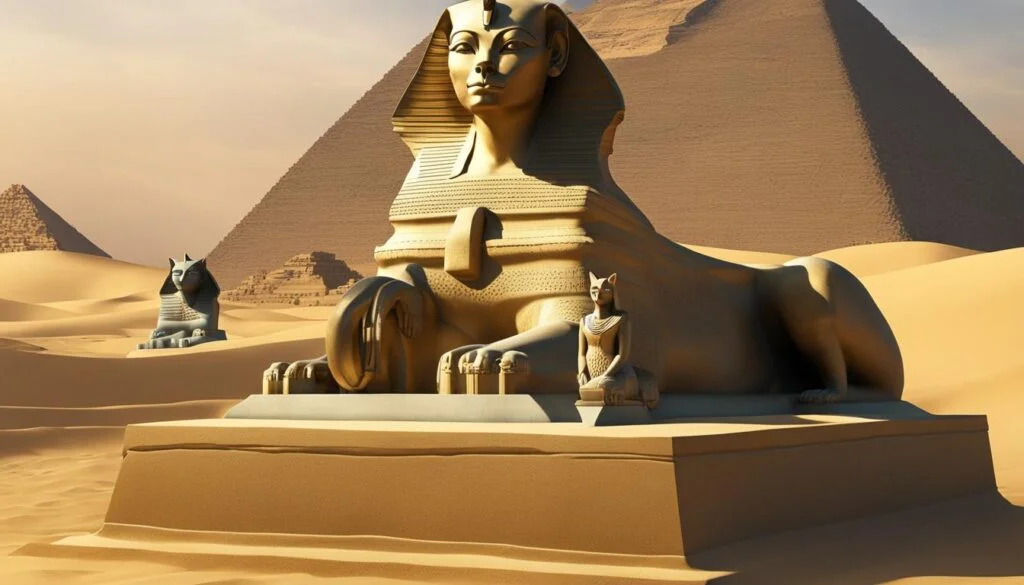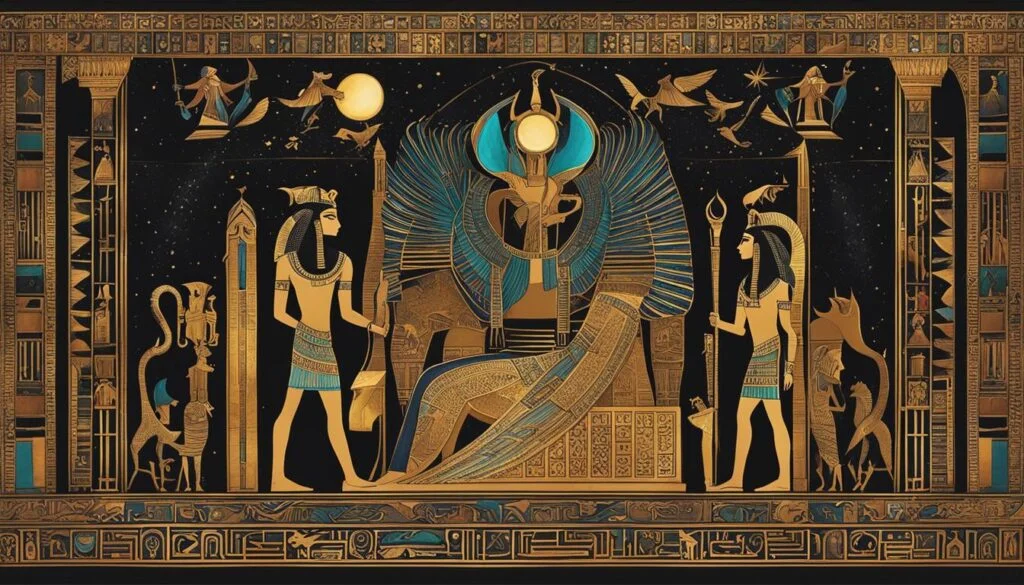Isis, the Egyptian goddess, holds a significant place in ancient Egyptian mythology. Her multifaceted roles as a wife and mother, mourner, and magical healer have made her one of the most revered and powerful goddesses of that era.
But what does Isis represent in Egyptian mythology? Let’s explore the rich symbolism and intriguing stories surrounding this goddess to uncover her true essence.
Key Takeaways:
- Isis is a prominent goddess in ancient Egyptian mythology.
- She embodies magic, motherhood, and healing.
- Isis had strong ties to kingship and the pharaohs.
- Her origins trace back to the union of earth and sky gods.
- Isis became an emblem of maternal love and care.
- The story of Isis and Osiris is central to Egyptian mythology.
- The cult of Isis spread throughout ancient Egypt and beyond.
The Role of Isis in Egyptian Mythology
In Egyptian mythology, Isis played a significant role, particularly in relation to kingship and the pharaohs.
She was revered as a principal deity in rites for the dead and offered assistance to the deceased kings.
As ideas about the afterlife evolved, Isis extended her help to all dead Egyptians, becoming a symbol of hope and guidance in the journey beyond.
Isis was often depicted as a beautiful woman wearing a sheath dress, symbolizing her grace and elegance.
She adorned her head with symbols representing her power and authority, such as the hieroglyphic sign of the throne, a solar disk, and cow’s horns.
These symbols emphasized her connection to kingship and her role in supporting the ruling pharaohs.
Throughout Egyptian mythology, the role of Isis evolved, reflecting the changing beliefs and values of the culture.
From her initial association with pharaohs and kings, she expanded her influence to become a guardian and protector for all Egyptians in their journey to the afterlife.
The Significance of Isis in Egyptian Mythology
Isis was highly revered for her nurturing and protective nature. She not only offered guidance to the deceased but also provided healing and comfort to the living.
As a principal deity, her significance in Egyptian mythology cannot be overstated. She represented the cycle of life and death, embodying the power of rebirth and transformation.
Furthermore, Isis’ role in Egyptian mythology highlights the importance of feminine power and motherhood in ancient Egyptian culture.
She served as an ideal wife and mother, demonstrating the value of family and the crucial role of women in society.
Overall, Isis played a multifaceted role in Egyptian mythology, embodying concepts of kingship, motherhood, and protection.
Her influence extended beyond religious practices and rituals, making her a revered figure in ancient Egyptian society.
The Origins of Isis
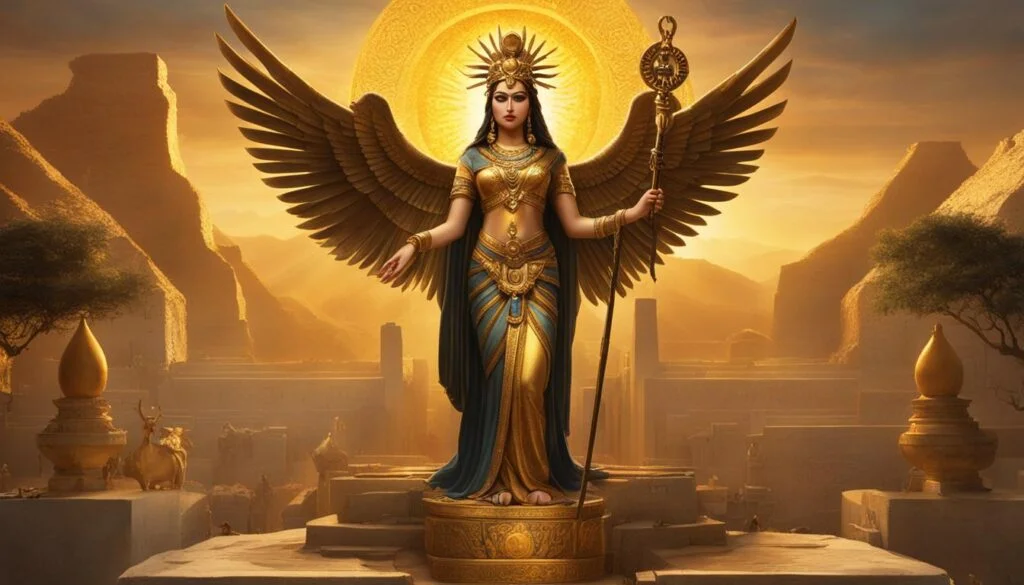
According to Egyptian mythology, Isis was the daughter of the earth god Geb and the sky goddess Nut.
She played a prominent role in ancient Egyptian culture as the wife and sister of Osiris, the god of the underworld.
Together, Isis and Osiris ruled over Egypt and were revered as powerful deities.
Aside from her royal status, Isis also served as a queen and a teacher, imparting knowledge and skills to the women of Egypt.
She was admired for her wisdom and revered as a symbol of female empowerment in Egyptian society.
The myth of Isis and Osiris, their divine marriage and enduring love, is one of the most well-known stories in Egyptian culture.
Symbolism of Isis
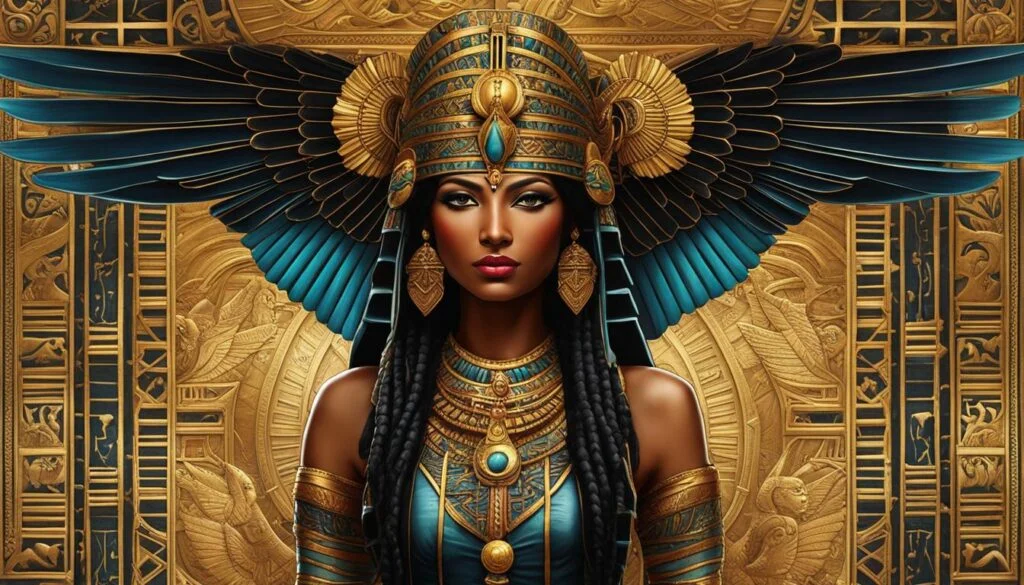
Isis, an important goddess in Egyptian mythology, is often depicted with various symbols that represent her unique attributes and significance.
These symbols hold deep meaning and offer insights into her role and character.
One of the most prominent symbols associated with Isis is the throne. The throne symbolizes her power and authority, highlighting her role as a queen and ruler.
It represents her divine status and her ability to govern and protect.
Another symbol closely connected to Isis is the moon disk and cow horns. These symbols emphasize her connection to femininity and motherhood.
The moon disk represents her association with feminine cycles, while the cow horns symbolize her nurturing and protective nature.
They demonstrate her role as a caring mother figure and a guardian of life.
Isis’s symbolism extends beyond these common representations. At times, she is depicted as a scorpion, a bird, a sow, or a cow, each symbolizing different aspects of her character.
The scorpion signifies her transformative and healing abilities, while the bird represents her connection to the heavens and her ability to traverse different realms.
The sow symbolizes fertility and abundance, and the cow is associated with nurturing characteristics.
These rich symbols associated with Isis emphasize her diverse roles and qualities. They provide a visual language through which her significance in Egyptian mythology can be understood and appreciated.
Isis as the Goddess of Magic and Healing
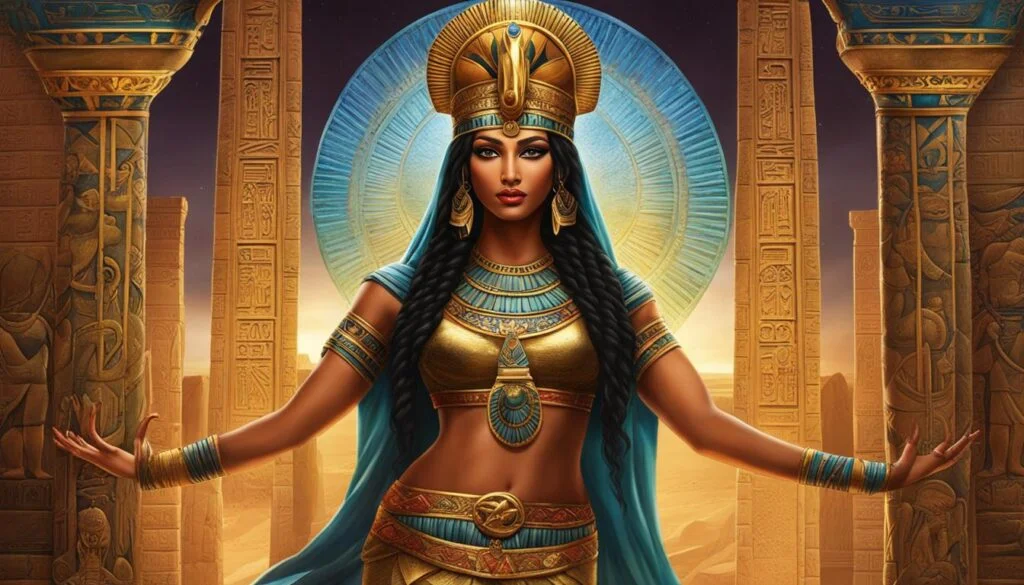
Isis, the Egyptian goddess, held a position of great reverence in ancient Egyptian mythology. She was not only known for her beauty and power but also for her exceptional abilities as a magician.
Widely regarded as the most skilled magician among all the deities, Isis possessed unrivaled magical powers.
She was capable of performing miracles and manipulating the forces of nature. Her abilities surpassed those of her fellow gods and goddesses, making her a force to be reckoned with.
The people of ancient Egypt turned to Isis in times of sickness and despair, seeking her healing powers.
Her influence reached beyond the physical realm, extending to the spiritual well-being of individuals.
Devotees would invoke her name and pray for her intervention, believing in her ability to cure ailments and restore harmony.
Isis, along with other goddesses, played a crucial role in safeguarding the realm of the dead.
She offered protection and guidance to the deceased, ensuring a peaceful transition into the afterlife.
Egyptians believed that invoking her name would grant them the favor of a safe journey to the beyond.
Over time, Isis became associated with various other goddesses, expanding her dominion and powers.
Her influence extended to realms such as love, fertility, and wisdom, further solidifying her status as a multifaceted deity.
The Cult of Isis
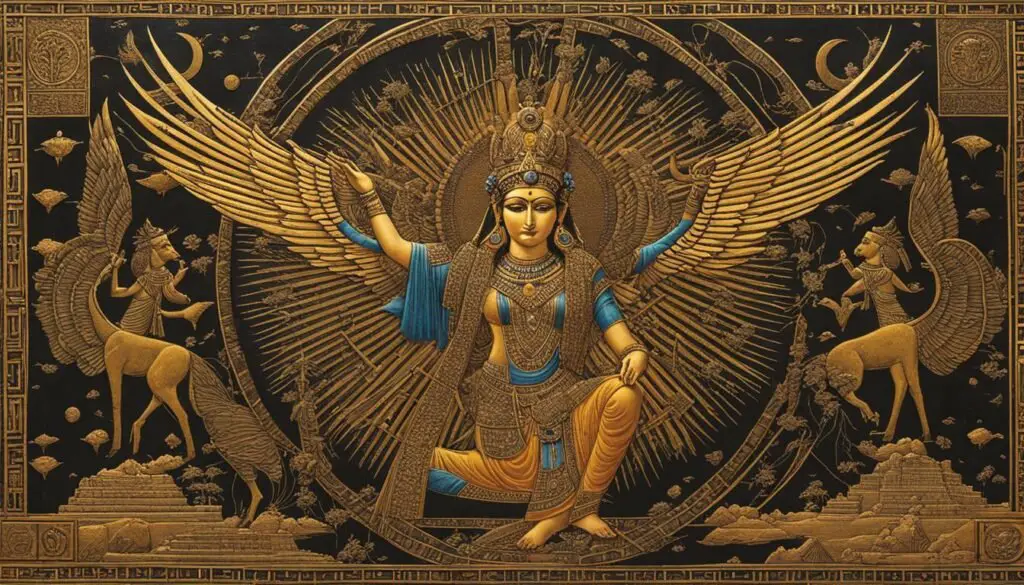
The cult of Isis held immense significance in ancient Egyptian culture, spreading its influence far beyond the boundaries of Egypt.
Revered as the goddess of magic, motherhood, and protection, Isis captivated the minds and hearts of people across various societal strata.
From the temples of Egypt to the vast Roman Empire, the worship of Isis gained momentum, permeating different regions and cultures.
Devotees honored her in lands as distant as England and Afghanistan, and her influence continues to be cherished by pagans even in modern times.
The popularity of the cult can be attributed to the multidimensional nature of Isis. Her appeal transcended religious boundaries and found resonance among people from all walks of life in ancient Egypt.
Regardless of social status, the power and symbolism of Isis resonated deeply within Egyptian culture.
Temples dedicated to Isis were erected across Egypt, serving as centers for spiritual practice and community cohesion.
Alexandria, a renowned city of ancient times, emerged as a hub for the worship of Isis.
The goddess extended her patronage to seafarers, solidifying her role as a benevolent and guiding force.
The devotion to Isis, steeped in reverence and acknowledgement of her significance, fostered a vibrant community that upheld her ideals.
The cult of Isis embodied the interconnectedness of ancient Egyptian society and showcased the profound impact a deity could have on individuals, families, and communities.
The Story of Isis and Osiris
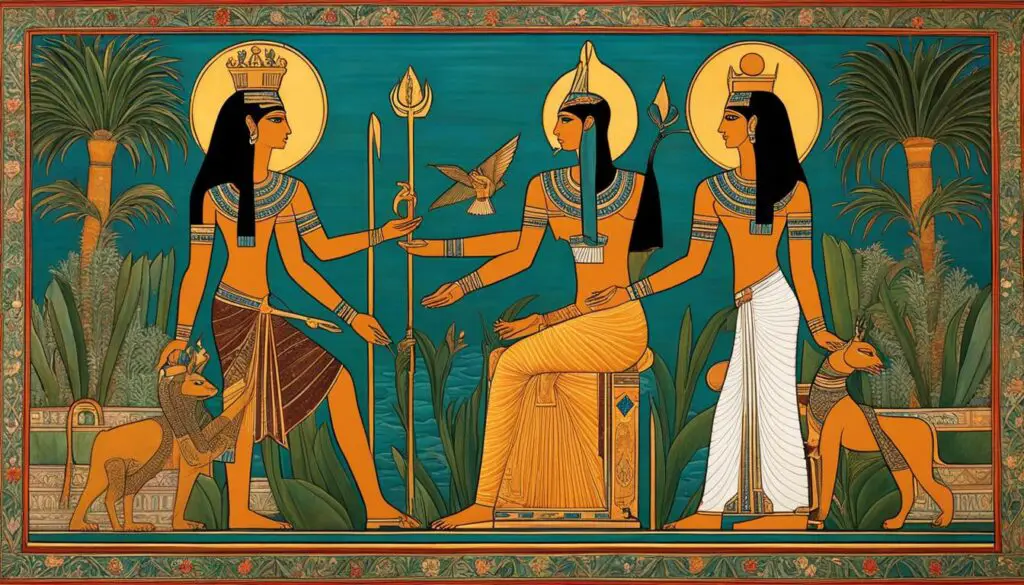
The story of Isis and Osiris is central to Egyptian mythology. Osiris, the husband of Isis and the god of the underworld, was tragically killed by his jealous brother Seth.
In her grief, Isis used her powerful magical abilities to resurrect him. Though she couldn’t bring him back to life completely, she transformed him into the god of the Egyptian afterlife.
Isis then gave birth to their son Horus, who grew up to avenge his father’s death and become the renowned sun god.
This tale of love, loss, resurrection, and revenge showcases the profound mythology surrounding Isis and her significant role in the Egyptian pantheon.
Key Points:
- ✅ The story of Isis and Osiris is central to Egyptian mythology.
- ✅ Isis used her magical powers to resurrect Osiris as the god of the Egyptian afterlife.
- ✅ Their son, Horus, avenged his father’s death and became the sun god.
Isis as a Symbol of Motherhood
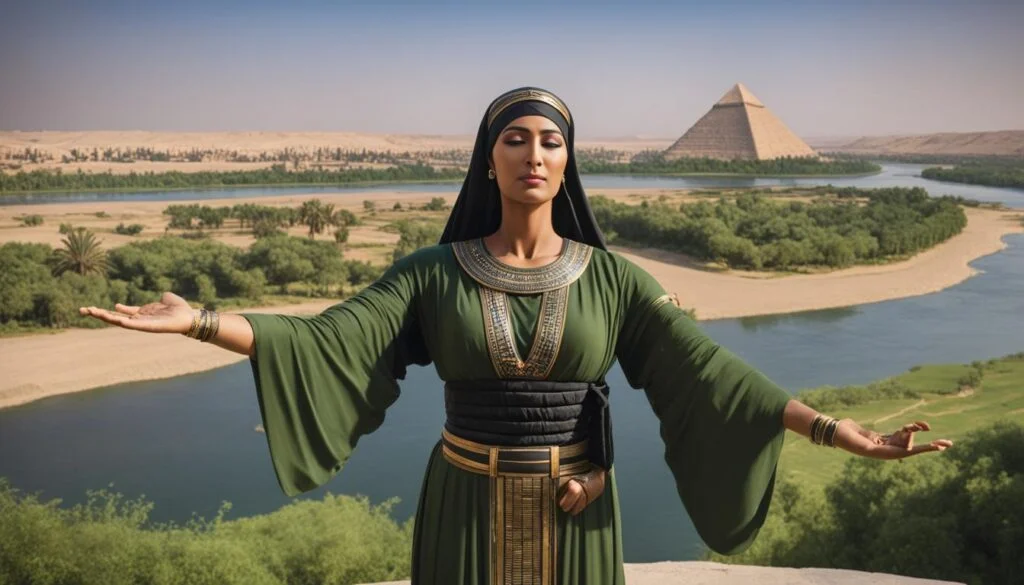
Isis, the revered Egyptian goddess, is often portrayed as the epitome of traditional Egyptian wife and mother.
She embodies the nurturing essence of motherhood and exemplifies the virtues of devotion and care within the family.
Her protective nature establishes her as a symbol of motherhood, highlighting the utmost significance of maternal love and affection in the ancient Egyptian culture.
One of the pivotal roles played by Isis was that of a mother to her son Horus.
Her tender care and unwavering dedication to her child illustrate the qualities admired in a mother.
The relationship between Isis and Horus exemplifies the strong bond between a mother and her child, demonstrating the profound love and support that mothers provided in ancient Egyptian society.
Isis’s role as a symbol of motherhood goes beyond her personal experience as a mother.
She represents the universal importance of maternal love and care, serving as an inspiration for all mothers to embrace their nurturing instincts.
Ancient Egyptians revered Isis for her ability to provide guidance and protection to both her family and the wider community.
Her nurturing attributes are a testament to the role of mothers in shaping society and fostering compassion and love.
Through her portrayal as a symbol of motherhood, Isis continues to inspire and resonate with individuals today.
The notion of maternal love and care transcends time and culture, making Isis’s significance enduring and universal.
Her embodiment of motherhood symbolizes the profound impact that mothers have on their families and communities, emphasizing the timeless and essential nature of their role.
The Symbolism of Nut in Egyptian Mythology
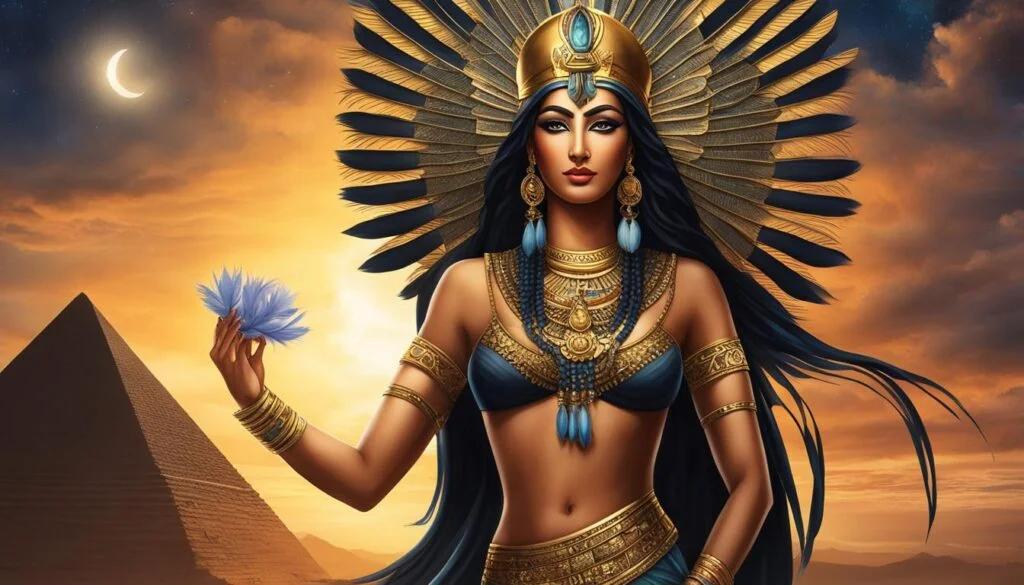
In Egyptian mythology, Nut is a significant goddess closely associated with the goddess Isis.
As the goddess of the sky, Nut plays a crucial role in the ancient Egyptian belief system.
She is often depicted as a woman with blue skin and outstretched wings, symbolizing her connection to the heavens and her protective nature.
Nut is the mother of Osiris and Isis, two prominent figures in Egyptian mythology.
Her primary role is to receive and safeguard the souls of the deceased, ensuring their safe passage into the afterlife.
Her nurturing and protective qualities align with the attributes commonly associated with the goddess Isis.
In ancient Egyptian culture, Nut was revered for her role in maintaining the cosmic order and regulating the cycles of life and death.
She was believed to swallow the sun each night and give birth to it every morning, symbolizing the eternal cycle of day and night.
This association with the celestial and the divine further reinforces the connection between Nut and the goddess Isis.
Depiction and Symbolism
The depiction of Nut as a woman with outstretched wings represents her protective embrace over the deceased.
The blue color of her skin symbolizes the heavens and the infinite expanse of the sky.
Her nurturing nature is reflected in her role as a mother, caring for the souls of the departed and guiding them in their journey to the afterlife.
In addition to her protective role, Nut’s presence in Egyptian mythology also highlights the importance of the sky and the stars in ancient Egyptian culture.
The sky was seen as a representation of the divine, and Nut’s association with it further emphasized the belief in a higher power and an eternal afterlife.
The Connection to Isis
The close association between Nut and Isis in Egyptian mythology underscores the interconnectedness of various deities and their roles within the belief system.
Both goddesses embody aspects of motherhood, protection, and the divine feminine. Their complementary roles highlight the importance of balance and harmony in ancient Egyptian society.
Together, Nut and Isis represent the power and symbolism of femininity in Egyptian mythology.
Their connection reinforces the significance of the goddess Isis and her multifaceted nature as a powerful deity associated with magic, motherhood, and protection.
Conclusion
In Egyptian mythology, Isis is revered as a powerful goddess symbolizing magic, motherhood, and protection.
Her captivating story and symbolism have enthralled people for centuries, and her cult continues to thrive across cultures and time periods. Isis represents the profound importance of feminine power, the healing arts, and the cycle of life and death in ancient Egypt.
As an Egyptian goddess, Isis held significant roles in kingship, rites for the dead, and as a teacher to women.
Her association with the throne, the moon disk, and cow horns represent her power, femininity, and motherhood.
Isis’ diverse attributes were often depicted in various forms, such as a scorpion, bird, sow, or cow.
The story of Isis and Osiris is a central narrative in Egyptian mythology, highlighting her role in resurrecting her deceased husband and assisting him in becoming the god of the Egyptian afterlife.
As a mother, Isis exemplifies devotion and protection, embodying the ideal traditional Egyptian wife and mother.
The influence of Isis extended beyond religious realms, reaching people from all walks of life.
Her worship spread throughout the Roman Empire, and she remains revered by pagans today.
The legacy of Isis in Egyptian mythology is a testament to the enduring allure of her powerful character and the ideals she represents.
Frequently Asked Questions
Q: What is Isis the goddess of?
A: Isis is an ancient Egyptian goddess associated with motherhood, fertility, magic, death, and rebirth. She is one of the most important goddesses in Egyptian mythology.
Q: Is Isis the wife of Horus?
A: No, Isis is not the wife of Horus. Isis is the mother of Horus. Horus’s father is Osiris, the god of the afterlife, who was also Isis’s husband.
Q: What is the spiritual meaning of Isis?
A: Spiritually, Isis represents the maternal spirit in its most nurturing aspect. She is often seen as the ideal mother and wife, as well as a patroness of nature and magic.
Q: Did Isis marry her brother?
A: Yes, in Egyptian mythology, Isis was married to her brother, Osiris. Marriages between deities who were siblings were a common theme in ancient Egyptian mythology.
Q: Did Horus and Isis have a child?
A: No, Horus and Isis did not have a child together. Horus is the son of Isis and Osiris.
Q: How did Isis become pregnant with Horus?
A: According to Egyptian mythology, Isis became pregnant with Horus after reviving her husband Osiris through her magical powers. She then conceived Horus.
Q: Did Horus marry his mother?
A: No, Horus did not marry his mother, Isis. Horus was often depicted as her protector and was associated with pharaonic power.
Q: Who impregnated Isis?
A: Isis was impregnated by her husband Osiris, in Egyptian mythology. After Osiris was killed by Set, Isis used her magic to resurrect him and conceive Horus.
Q: Why did Osiris marry his sister?
A: In Egyptian mythology, it was common for deities to marry their siblings. Osiris marrying his sister Isis reflects the Egyptian mythological tradition where such unions were symbolic and represented the harmonious balance of nature.
Q: How did Osiris get pregnant?
A: The phrase “Osiris getting pregnant” is not accurate in the context of Egyptian mythology. It was Isis who became pregnant with Horus after reviving Osiris. Osiris did not become pregnant.


